Geneva/Berlin – The 59th session of the United Nations Human Rights Council (UN HRC59) was held from 16 June to 9 July was marked by urgent discussions on intensifying global crises, including armed conflicts, climate breakdown, and repression of civil society. While the High Commissioner for Human Rights, Volker Türk, acknowledged human rights violations in Tibet, his oral update remained general and fell short of expectations for a more detailed and robust condemnation of China’s repression in the region.
The International Campaign for Tibet (ICT), on behalf of the Helsinki Foundation for Human Rights, actively participated in the session, highlighting the deteriorating human rights situation in Tibet through multiple avenues, including oral statements and a public side event.
Oral statements at Interactive Dialogues
In an oral statement delivered by ICT Advocacy Officer Ellamae Hamm on behalf of the Helsinki Foundation for Human Rights at the Interactive Dialogue with the UN Special Rapporteur on Climate Change and Human Rights, ICT raised serious concerns over China’s aggressive development of hydropower dams in Tibet. Drawing from ICT’s December 2024 report, “Chinese Hydropower: Damning Tibet’s Culture, Community, and Environment,” the statement detailed that since 2000, at least 193 hydropower projects have been planned or constructed on the Tibetan plateau.
These large-scale projects have already displaced thousands of Tibetans, destroyed centuries-old monasteries, and disrupted fragile ecosystems. ICT emphasized that up to 1.2 million Tibetans are at risk of losing their homes if China continues these policies. Despite being promoted as clean energy, studies show that such dams emit significant methane emissions and contribute to long-term environmental and cultural harm. ICT called for an immediate halt to hydropower expansion in Tibet and urged international actors not to finance these rights-violating projects.
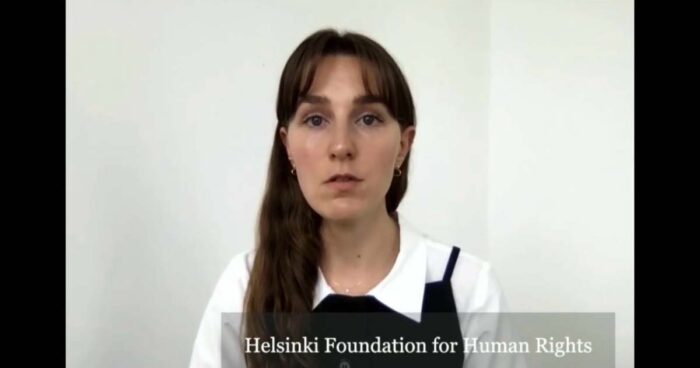
Statement by ICT Advocacy Officer Ellamae Hamm during the Interactive Dialogue on Climate Change and Human Rights on behalf of the Helsinki Foundation for Human Rights. (Source: UN Web TV)
Notably, in a formal right of reply (UN Web TV, time stamp: 01:03:06) to the statement, Zhu Yuejiangnan, representative of the Chinese delegation to the Council, stated that “some countries have been using NGOs to spread lies to attack China”, adding that those countries “are standing on the opposite side of the international community” and should have “a hard look at themselves”. Zhu remarked that the Chinese government was “fully respecting customs and traditions of local people”.
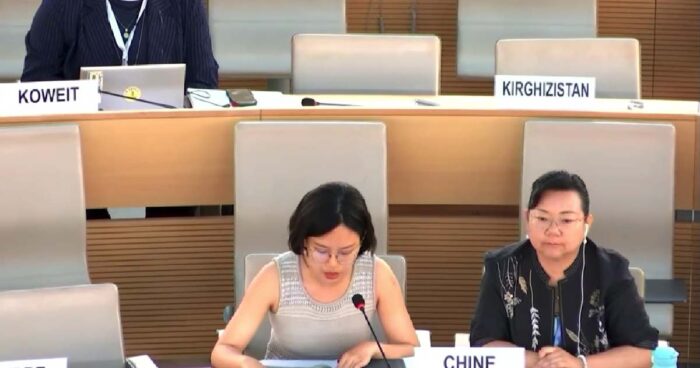
Right of reply statement by Zhu Yuejiangnan, representative of the Chinese delegation to the Council. (Source: UN Web TV)
ICT’s EU Policy Director, Vincent Metten also spoke on behalf of the Helsinki Foundation for Human Rights delivering an oral statement at the Interactive Dialogue with the Special Rapporteur on Freedom of Assembly and Association, addressing the criminalization of religious expression in Tibet. The statement highlighted the continued imprisonment of three Tibetan monks, Drugdra, Lobsang Khedrub, and Lobsang Gephel, for organizing a celebration of the Dalai Lama’s 80th birthday in 2015. Now, nearly a decade later, the monks remain in prison without access to healthcare or contact with their families.
This ongoing repression violates Articles 18 of both the Universal Declaration of Human Rights and the International Covenant on Civil and Political Rights, which guarantee freedom of thought, conscience, and religion. The ICT called on all states to defend Tibetans’ right to honor their spiritual leader without fear of retaliation.
In response to Metten’s remarks, in a formal right of reply (UN Web TV, time stamp: 02:51:44), Ouyang Ruize, the representative of the Chinese delegation to the Council, described the Dalai Lama as a “tool of international anti-China forces and the main source of social unrest and instability” in Tibet, while adding further accusations to his remarks about the Nobel Peace Laureate.
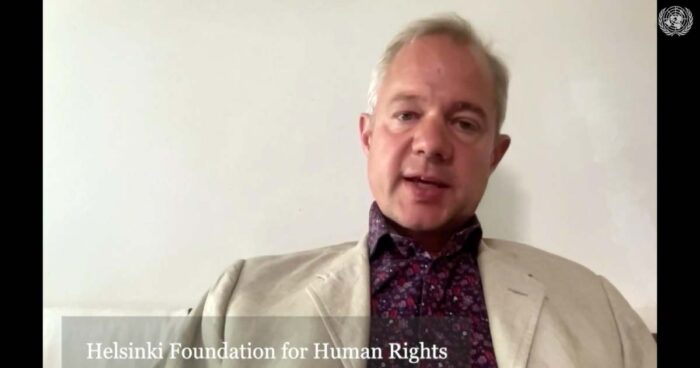
Statement by ICT EU Policy Director Vincent Metten during the Interactive Dialogue on Freedom of Assembly and Association on behalf of the Helsinki Foundation for Human Rights. (Source: UN Web TV)
Side events in the Palais des Nations
Side events at the United Nations Human Rights Council are informal meetings or panel discussions that take place alongside the official sessions of the Council in Geneva, at the Palais des Nations. These events are organized by member states, NGOs, UN bodies, or other stakeholders and serve as platforms to raise awareness, to provide space for civil society and affected individuals to share testimonies and advocate for action, and to offer expert analysis and recommendations that can influence the positions of states and the outcomes of the Council.
At a side event titled “Freedom of religion and the interference in the appointment of religious clergy in Tibet”, organised by the Helsinki Foundation for Human Rights, ICT President Tencho Gyatso, Dr Gyal Lo from the Tibet Action Institute and Gloria Montgomery from the Tibet Justice Center, highlighted the religious, cultural, and political impact of China’s efforts to dominate the Tibetan reincarnation system, with a particular view on the succession of the Dalai Lama. In a recorded statement, UN Special Rapporteur on Freedom of Religion or Belief, Nazila Ghanea, strongly condemned China’s interference in the succession of the Dalai Lama. She urged Beijing to withdraw laws controlling the appointment of Tibetan Buddhist leaders and to reveal the whereabouts of the abducted Panchen Lama. The event, moderated by Kai Mueller, was attended by more than 50 representatives from states and civil society.
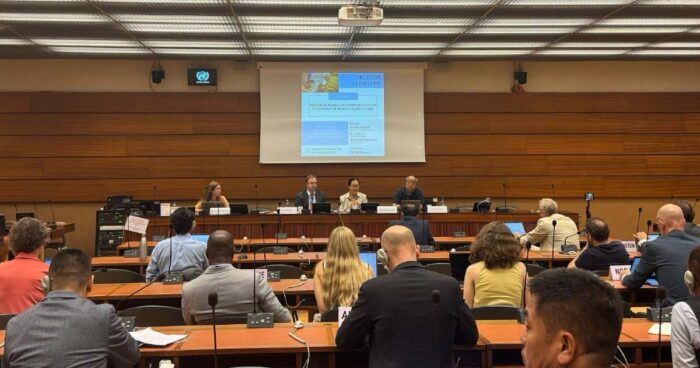
Side event by the Helsinki Foundation on “Freedom of religion and interference in the appointment of religious clergy in Tibet”. (Source: ITN)
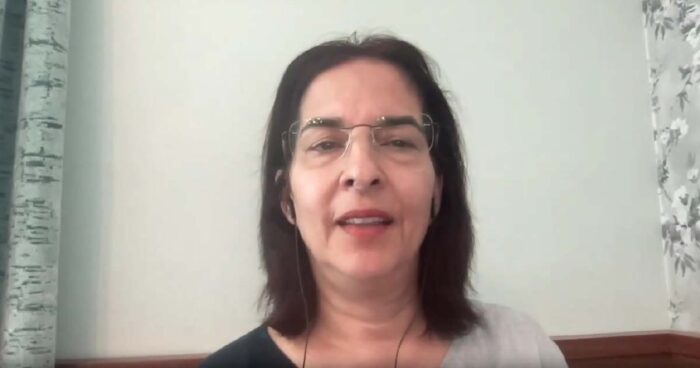
Recorded statement by Special Rapporteur on Freedom of Religion or Belief, Nazila Ghanea. (Source: UNSR)
A side event on Tibetan Buddhism and freedom of religion or belief, organized by the UK Mission to the UN and co-sponsored by 15 states (Australia, Canada, Czech Republic, Denmark, Estonia, Finland, Germany, Iceland, Liechtenstein, Latvia, Lithuania, Norway, Sweden, Ukraine), focused on China’s interference in the reincarnation of Tibetan spiritual leaders. The panel included: the Representative of His Holiness the Dalai Lama, Thinlay Chukki, Tibetan rights advocate Chemi Lhamo, the UK Special Envoy for Freedom of Religion or Belief David Smith MP, and the UN Special Rapporteur for Freedom of Religion or Belief, Nazila Ghanea. The event was moderated by the UK ambassador to the UN, Simon Manley.
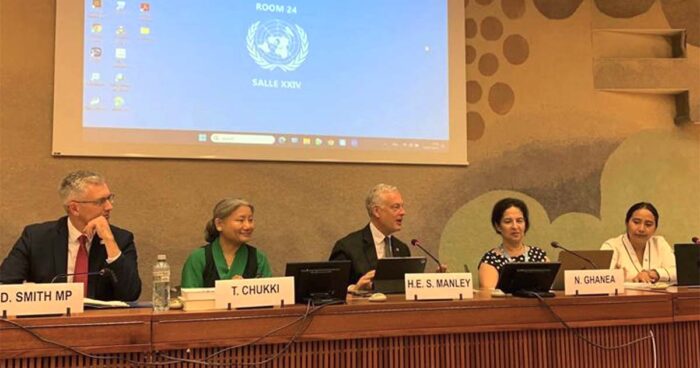
Side Event by the UK Mission to the UN on “Freedom of religion or Belief: Tibetan Buddhism.” (Source: UK Mission)
A side event organized by the International Service for Human Rights (ISHR) and the Campaign for Uyghur discussed transnational repression, in which Tibetans, Uyghurs, and Hong Kong activists often face threats beyond China’s borders. Speakers on the panel included: Representative Thinlay Chukki, Topjor Tsultrim from Students for a Free Tibet, Amy Siu (Freiheit für Hongkong), Rushan Abbas (Campaign for Uyghurs) and Turgunjan Alawdun (WUC). The event was moderated by Raphael Viana David (ISHR).
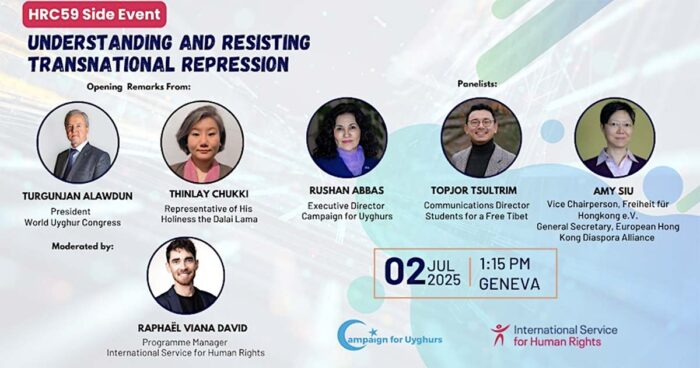
Side event flyer by ISHR on “Understanding and resisting transnational repression”. (Source: ISHR)
Civil society submission
The Society for Threatened Peoples submitted a written statement to the HRC59, drawing attention to the continued persecution of Tibetans under China’s rule. The submission highlighted the severe restrictions on religious freedom, forced assimilation of Tibetan children through the boarding school system, and the systematic dismantling of Tibetan cultural identity. It urged the UN to appoint a Special Rapporteur to investigate the situation in Tibet and called on member states to demand accountability from China for its ongoing violations of international human rights standards.